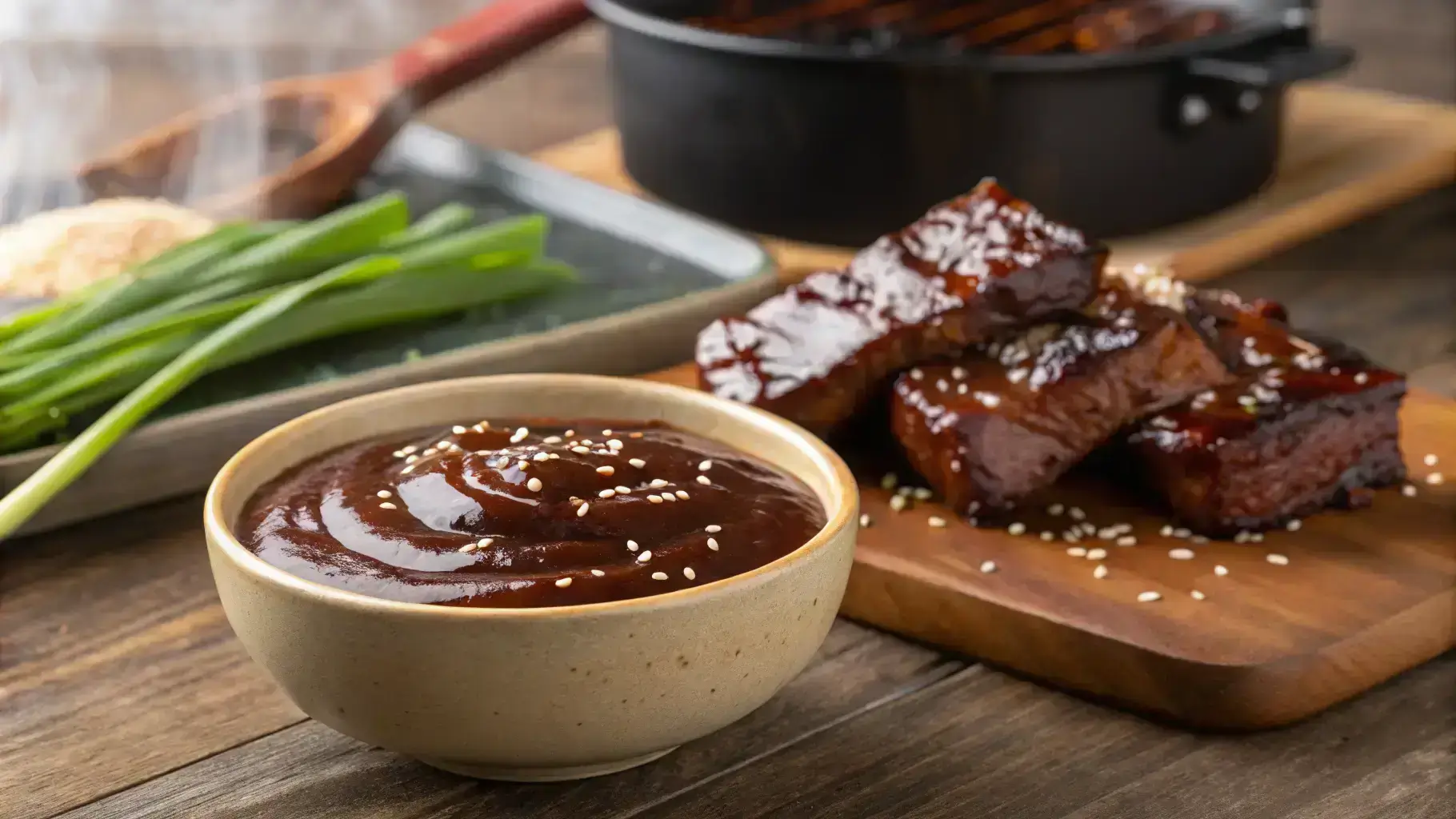Table of Contents
The ingredients that make up Korean BBQ sauce
A fundamental aspect of Korean BBQ sauce lies in its key components, which include soy sauce, sugar, and sesame oil[1]. Soy sauce serves as the backbone of the marinade, providing a deep, savory, umami flavor that enhances the taste of grilled meats[2]. Dark brown sugar is often added to create a balance of sweetness, which complements the saltiness of the soy sauce and adds a caramelized depth when cooked[3]. Additionally, sesame oil, particularly toasted sesame oil, contributes a rich, nutty aroma and flavor that elevates the overall profile of the sauce[1]. Together, these ingredients form a harmonious foundation that captures the essence of Korean BBQ.
RELATED: How To Make Unbeatable Raising Cane’s Sauce Recipe You’ll Love!
Garlic and ginger play a pivotal role in enriching the flavor of Korean BBQ sauce, adding layers of bold and aromatic notes. Fresh garlic provides a robust, spicy quality that enhances the savory elements of the sauce, while ginger introduces a warm, spicy undertone that brightens the overall flavor profile[5]. The combination of these two aromatics not only deepens the sauce’s complexity but also infuses it with a distinct freshness that is characteristic of Korean cuisine[3]. As a result, incorporating garlic and ginger is essential for creating an authentic and flavorful Korean BBQ sauce that tantalizes the taste buds.
In addition to the core ingredients, optional ingredients like gochujang and fruit purees can elevate Korean BBQ sauce to new heights[6]. Gochujang, a fermented Korean chili paste, adds a unique blend of heat and sweetness, making it an excellent addition for those who enjoy a spicier profile[7]. Furthermore, fruit purees, such as Asian pear or even kiwi, can provide a subtle sweetness and additional depth, enhancing the sauce’s complexity[8]. These optional ingredients allow for customization, making it possible to tailor the sauce to individual preferences while still maintaining its essential Korean flavors.
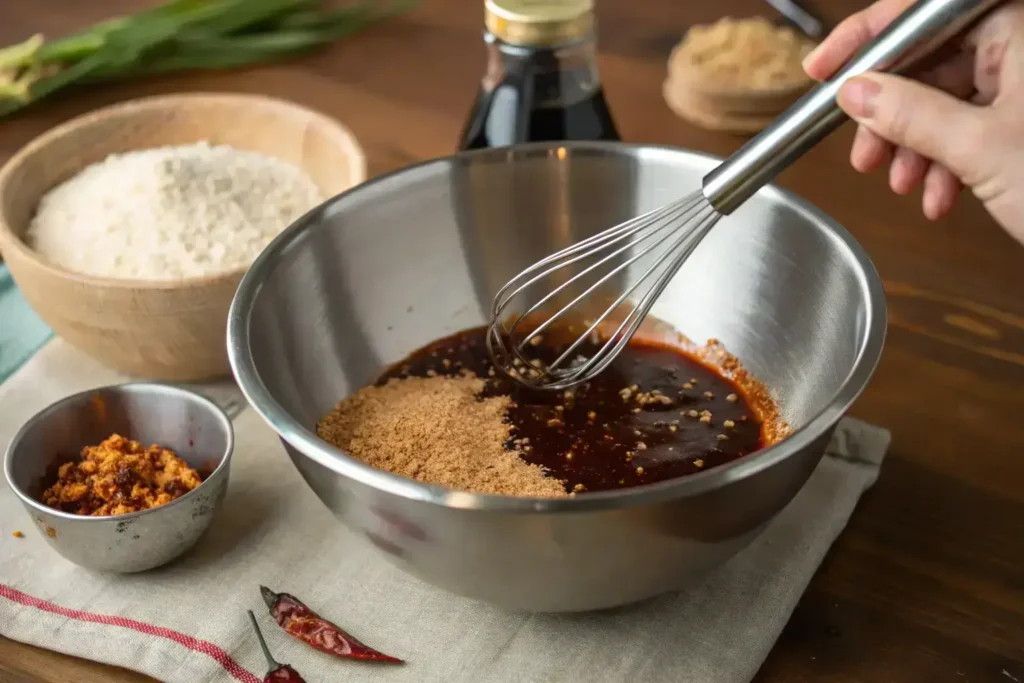
Different varieties of Korean BBQ sauce
When exploring the different varieties of Korean BBQ sauce, one must consider the distinction between traditional marinades and store-bought sauces[8]. Traditional marinades are often crafted at home using fresh ingredients, allowing for a personalized flavor profile that reflects regional tastes and individual preferences. These homemade sauces typically include vital components such as soy sauce, brown sugar, sesame oil, ginger, and garlic[9]. In contrast, store-bought options frequently contain additives like corn syrup and emulsifiers, which can alter the sauce’s texture and flavor[10]. While store-bought sauces may offer convenience and consistency, they can lack the depth and authenticity that homemade versions provide, making traditional marinades a favored choice for those seeking a genuine Korean BBQ experience[11].
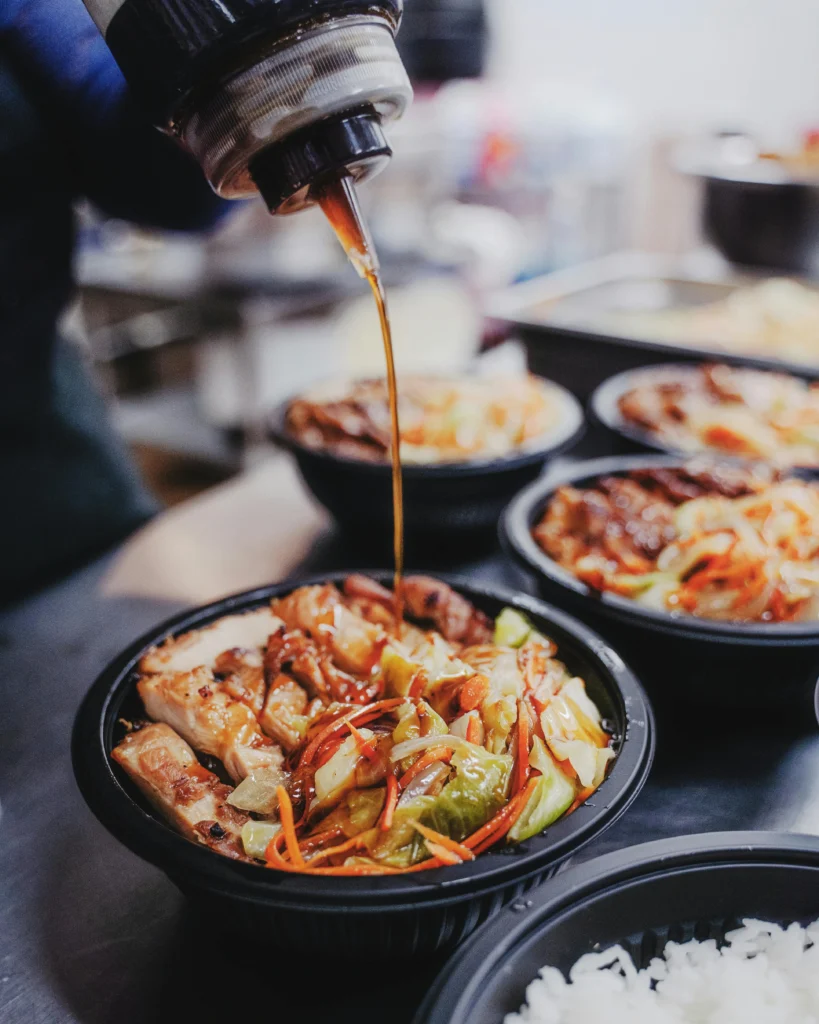
Korean BBQ sauce is also characterized by regional variations that influence its flavor profiles, showcasing the diversity of Korean cuisine[12]. For instance, sauces from the southern regions of Korea may emphasize sweeter notes, integrating ingredients like fruit purees or additional sugar. At the same time, northern varieties might lean towards a spicier profile, incorporating gochujang, a fermented chili paste[13]. This regional differentiation not only highlights the local culinary traditions but also allows for a rich tapestry of flavors that can cater to various palates. Additionally, the balance of flavors—sweetness, tanginess, and spiciness—remains a common thread across these regional sauces, making Korean BBQ a unique gastronomic experience that reflects the cultural nuances of the country[14].
For those interested in creating their Korean BBQ sauce at home, several popular recipes can transform simple ingredients into a flavorful condiment[8]. A quick and easy recipe entails whisking together soy sauce, brown sugar, vinegar, ginger, and sesame oil, resulting in a sauce that is both sweet and savory[2]. To enhance the flavor further, one can add chile-garlic sauce for a spicy kick or incorporate gochu garu for a smoky element[15]. The beauty of homemade Korean BBQ sauce lies in its versatility; it can be used as a marinade, a finishing sauce, or even a dipping sauce, making it a staple in Korean cooking that can elevate any dish to new heights of flavor[3].
The culinary uses of Korean BBQ sauce
One of the most popular culinary uses of Korean BBQ sauce is marinating meats for grilling[2]. The rich, sweet, and savory flavors of the sauce enhance the natural taste of various meats, making them incredibly tender and flavorful. A traditional Korean marinade often includes ingredients such as light soy sauce, sugar, garlic, and ginger, which not only impart flavor but also help to break down the meat fibers[16]. For instance, marinating beef short ribs or chicken in this sauce for several hours can significantly improve the overall taste and texture. The process of marination allows the flavors to penetrate deeply, resulting in a deliciously succulent dish that is perfect for grilling, especially when served with freshly cooked rice and vegetables.
Korean BBQ sauce is also an excellent choice for saucing vegetables and tofu, making it versatile for vegetarian and vegan dishes[17]. The sauce adds a burst of flavor to stir-fried vegetables or grilled tofu, elevating these ingredients from simple to sensational. For example, a delightful dish can be created by tossing crispy tofu cubes in a homemade Korean BBQ sauce alongside a medley of colorful vegetables like bell peppers, zucchini, and broccoli[18]. This combination not only satisfies the palate but also provides a healthy and satisfying meal option. The sauce’s sweet and tangy notes complement the natural flavors of the vegetables, making it a go-to for anyone looking to enhance their plant-based meals.
Additionally, Korean BBQ sauce can enhance dipping sauces and dressings, adding depth and complexity to an array of dishes[3]. A simple dipping sauce can be transformed by mixing Korean BBQ sauce with sesame oil, garlic, and a touch of vinegar, creating a flavorful accompaniment for dumplings, spring rolls, or grilled meats[19]. Moreover, this sauce can be incorporated into salad dressings, providing a unique twist to traditional vinaigrettes. By blending the BBQ sauce with ingredients like rice vinegar and sesame seeds, you can create a dressing that not only complements fresh greens but also adds an exciting Korean flair to your salads. This versatility makes Korean BBQ sauce a staple in many kitchens, as it can be used in various culinary applications to enhance the overall dining experience.
Health benefits and nutritional aspects of Korean BBQ sauce
Korean BBQ sauce boasts a rich nutritional profile primarily derived from its key ingredients, which include soy sauce, brown sugar, garlic, and sesame oil[20]. For instance, a typical serving of this sauce contains approximately 138.889 calories, with minimal fat content and a carbohydrate count of around 30.556 grams[21]. The presence of garlic not only enhances flavor but also offers health benefits, such as antioxidant properties and potential cardiovascular support. Additionally, sesame oil provides healthy fats, contributing to heart health and promoting skin vitality. Understanding the nutritional content of these ingredients allows individuals to appreciate how Korean BBQ sauce can be incorporated into a balanced diet while adding depth to various dishes.
For those seeking healthier alternatives to traditional sauces, Korean BBQ sauce presents a versatile option that can be modified to enhance its nutritional profile[8]. Substituting high-fructose corn syrup with brown rice syrup, for example, not only reduces the glycemic impact but also imparts an earthy sweetness to the sauce[2]. Furthermore, incorporating natural sweeteners such as honey or apple cider vinegar can enhance flavor while providing additional health benefits, such as improved digestion[22]. By making simple adjustments to the sauce’s ingredients, individuals can enjoy the bold flavors of Korean BBQ while adhering to healthier eating habits.
The role of fermented ingredients in Korean BBQ sauce also plays a crucial part in promoting gut health,
a subject that has garnered increasing attention among health experts[23]. Fermented foods, such as those containing gochujang, offer beneficial probiotics that can enhance digestion and bolster the immune system[24]. These probiotics are known to help regulate gut flora, potentially reducing the risk of chronic diseases and improving overall health[25]. Additionally, the consumption of fermented foods may contribute to weight management and metabolic health, making Korean BBQ sauce not only a flavorful addition to meals but also a functional component of a health-conscious diet.
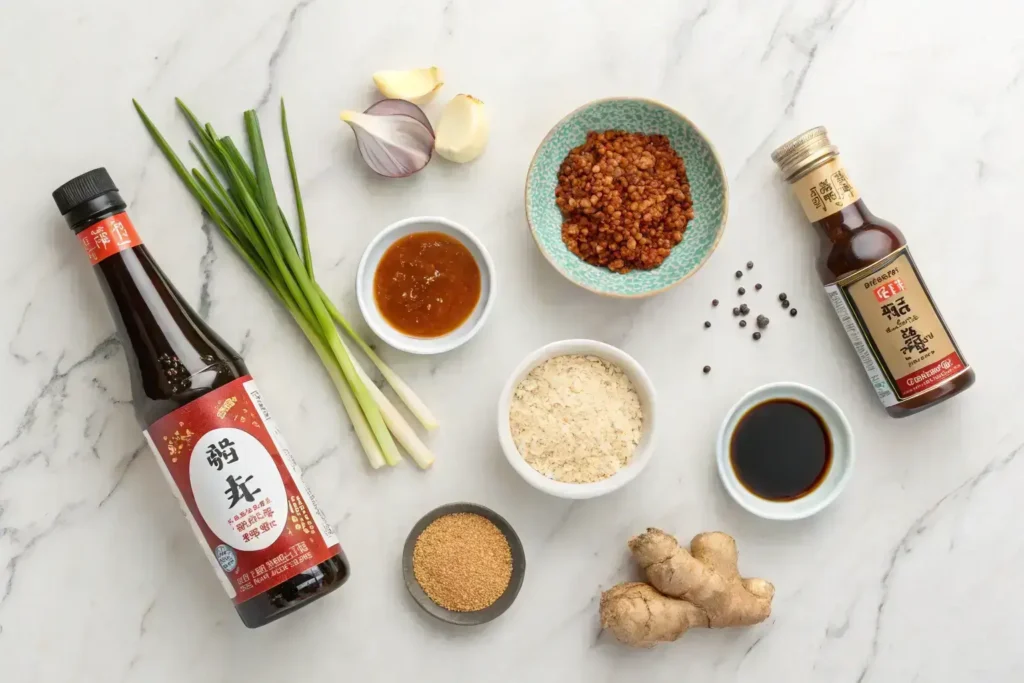
Tips for making the perfect Korean BBQ sauce
Creating the perfect Korean BBQ sauce hinges on achieving a harmonious balance between sweetness and savory flavors[2]. The combination of soy sauce and dark brown sugar serves as the foundation, providing a rich umami base that is both salty and sweet[27]. To enhance this flavor profile, incorporating pear juice is essential, as it not only adds aromatic sweetness but also acts as a natural meat tenderizer due to its enzymes[28]. This careful interplay of ingredients results in a sauce that is not merely delicious but also versatile, suitable for marinades, dipping sauces, and more. Ultimately, the goal is to ensure that each ingredient complements the others, creating a layered flavor experience that tantalizes the taste buds.
Adjusting the spice levels in your Korean BBQ sauce allows for personalization based on individual preferences[29]. The primary ingredients for heat are gochujang and sriracha, both of which can be modified according to your desired spice intensity[30]. Beginners may want to start with a smaller amount and gradually increase it, ensuring the sauce remains enjoyable without overwhelming the palate[31]. Additionally, incorporating spices like black pepper and red pepper flakes can further enhance the flavor while allowing for more customization[5]. This adaptability makes the sauce appealing to a broader audience, catering to those who prefer milder flavors as well as spice enthusiasts.
How to Store and Preserve Homemade Korean BBQ Sauce for Maximum Freshness
Proper storage and preservation of homemade Korean BBQ sauce are crucial for maintaining its freshness and flavor. After preparing the sauce, allow it to cool to room temperature, then transfer it to an airtight container or a mason jar, where it can be stored in the refrigerator for up to one week. If you want to extend its shelf life, freezing the sauce for up to one month is an excellent option. It’s essential to note that the sauce can retain its quality for several weeks when properly stored, making it convenient to have on hand for various meals. This longevity not only saves time but also allows for the enjoyment of homemade flavors whenever desired.
FAQs
Print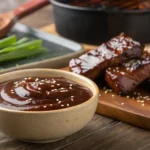
Authentic Korean BBQ Sauce
- Total Time: 10 minutes
- Yield: 8 servings
Description
This easy homemade Korean BBQ sauce is sweet, savory, and slightly spicy. Perfect for marinating meats, grilling, or dipping!
Notes
Include tips like:
-
For a spicier sauce, add more gochujang.
-
Store in an airtight container in the fridge for up to 1 week.
-
Great for grilled meats, tofu, or veggies
- Prep Time: 10 minutes
- Category: sauce
- Cuisine: korean
Nutrition
- Calories: 50
Keywords: homemade BBQ sauce, Korean, Korean marinade
Q: What are the main ingredients in Korean BBQ sauce?
A: Korean BBQ sauce typically includes soy sauce, sugar (often brown sugar), and sesame oil as its key components. Garlic and ginger are essential for adding depth of flavor. Optional ingredients can include gochujang (Korean chili paste) for heat and fruit purees like pear or apple for added sweetness and complexity.
Q: How do homemade Korean BBQ sauces differ from store-bought versions?
A: Homemade Korean BBQ sauces often allow for customization in flavor and ingredient quality, enabling you to balance sweetness, spice, and savory notes to your preference. Store-bought sauces may contain preservatives and artificial flavors, while homemade versions can use fresh, natural ingredients. Additionally, there are regional variations of Korean BBQ sauce that can be replicated in homemade recipes.
Q: How can I use Korean BBQ sauce in my cooking?
A: Korean BBQ sauce is versatile and can be used in various ways: marinate meats like beef, pork, or chicken before grilling for an authentic flavor; drizzle it over grilled vegetables or tofu; and mix it into dipping sauces or salad dressings to enhance their flavor profile.
Q: Are there any health benefits to using Korean BBQ sauce?
A: Korean BBQ sauce contains ingredients like soy sauce and garlic, which have potential health benefits, including antioxidant properties and improved gut health. However, it can be high in sodium, so healthier alternatives can include low-sodium soy sauce or homemade versions with reduced sugar. The use of fermented ingredients may also contribute to better digestion.
Q: What tips can help me create the perfect Korean BBQ sauce at home?
A: To make the perfect Korean BBQ sauce, focus on balancing sweetness and savory flavors by adjusting sugar and soy sauce ratios. Spice levels can be tailored by adding more or less gochujang or chili flakes. Additionally, store homemade sauces in an airtight container in the refrigerator for up to a week for optimal freshness.
conclusion
Korean BBQ sauce is a versatile and flavorful condiment that can elevate a variety of dishes, from marinated meats to vibrant vegetable dishes. With its critical ingredients like soy sauce, sugar, and sesame oil, alongside the aromatic additions of garlic and ginger, this sauce offers a delicious balance of sweet and savory flavors that can be customized to suit personal tastes. The diversity among traditional marinades and store-bought options, as well as regional variations, showcases the rich culinary heritage of Korean cuisine. Additionally, Korean BBQ sauce not only enhances the taste of meals but also provides health benefits through its nutritional content and fermented ingredients. Whether you choose to create your homemade version or opt for a store-bought alternative, the following tips for perfecting the sauce will ensure a delightful addition to your dining experience. Embracing the art of Korean BBQ sauce allows you to enjoy a unique and satisfying culinary journey, blending tradition with modern flavors.
Last Updated on May 31, 2025 by Carla

